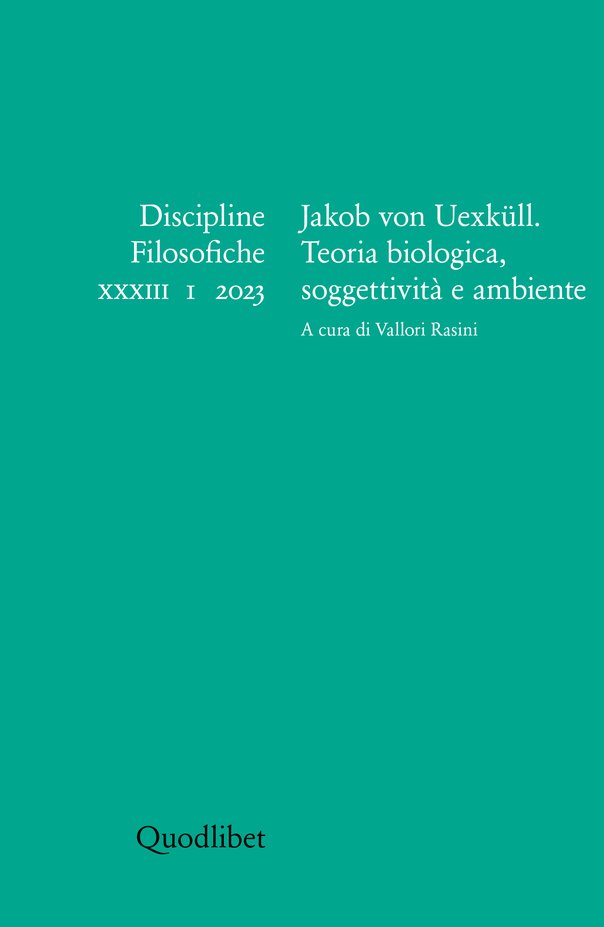XXXIII, 1, 2023: Jakob von Uexküll. Biological Theory, Subjectivity and Environment. Edited by Vallori Rasini
 The “theoretical” biologist Jakob von Uexküll represents the case of a scientist who “re-emerged” in the history of western thought. He obtained the title of “forerunner” of contemporary ecologism and zoosemiotic research as far as “inventor” of the modern concept of “environment”. Despite certain hasty attributions, the importance of some of his insights into the philosophical and scientific culture of the time must be recognized. During the Third German Congress of Philosophy, held in Bremen in 1950, a meaningful study session was devoted to the debate on the meaning of environment according to von Uexküll’s approach. His theory of “individual environments” appeared revolutionary in some respects, because it challenged assumptions of positivistic thinking that were considered rigid and partial, and met the needs for categorical renewal advanced by the new human sciences.
The “theoretical” biologist Jakob von Uexküll represents the case of a scientist who “re-emerged” in the history of western thought. He obtained the title of “forerunner” of contemporary ecologism and zoosemiotic research as far as “inventor” of the modern concept of “environment”. Despite certain hasty attributions, the importance of some of his insights into the philosophical and scientific culture of the time must be recognized. During the Third German Congress of Philosophy, held in Bremen in 1950, a meaningful study session was devoted to the debate on the meaning of environment according to von Uexküll’s approach. His theory of “individual environments” appeared revolutionary in some respects, because it challenged assumptions of positivistic thinking that were considered rigid and partial, and met the needs for categorical renewal advanced by the new human sciences.
Born in Estonia but belonging to German culture, von Uexküll was a specialized marine zoologist and convinced laboratory experimenter, and at the same time a passionate scholar of philosophical studies. The scientist published a significant essay in 1909 entitled Umwelt und Innenwelt der Tiere. In it, on the subject of biological investigation, he stated: “our anthropocentric way of seeing things must increasingly move away and the animal’s point of view must become the only decisive one”. He emphasised a specific difference between different organisms, the substantial autonomy of their spheres of existence and the irreducibility of the living environment to a single, objective space. Here was the demand for a new way of investigating living things and thus for a new way of asking the fundamental questions of science, as demonstrated in the 1920 work, Theoretische Biologie. In this work, von Uexküll fleshed out his ideas by relying on a concept of Umwelt based on precise gnoseological reflections. Each organism is a subjective entity that, according to its constitution, selects certain stimuli from the outside world processes and responds in a particular way; these responses, in turn, produce certain effects on the world, which influence the stimuli.
The resonance of von Uexküll’s thought is demonstrated by the important and meritorious activity of the Institut für Umweltforschung in Hamburg, but also by its immediate reception and critical discussion by philosophical anthropology and some of the greatest thinkers of the time, such as Martin Heidegger and Ernst Cassirer. In the decades that followed, and up to the “rediscovery” of our own day, various philosophers, psychologists and semiologists referred to his work, drawing insight and fruitful ideas from his intellectual originality.
Contents
(click on the titles to view the abstracts)
Vallori Rasini, Presentazione
Giuseppe Flavio Artese, Francesca Michelini, La ricezione di Jakob von Uexküll nella psicologia ecologica e nell’enattivismo
Felice Cimatti, Con Uexküll, oltre Uexküll. Per un’ontologia relazionale
Andrea Gentili, La Umweltlehre tra Uexküll e Husserl
Luca Guidetti, Il problema del tempo e dello spazio in Jakob von Uexküll
Kristian Köchy, Biologie als Zusammenhang der objektiven Prozesse mit den subjektiven Phänomenen. Zum Kantbezug von Uexkülls Theoretischer Biologie
Luigi Laino, Alla ricerca della coscienza dall’animale all’uomo: l’influenza di Jakob von Uexküll su Ernst Cassirer
Emilia Marra, Andar tastando con lo sguardo. La scienza impossibile di von Uexküll
Marco Mazzeo, Il naso di Uexküll. Olfatto, ambiente, proprietà privata
Fabio Polidori, Il chiarimento dell’enigma. Martin Heidegger e la biologia di Jakob von Uexküll
Vallori Rasini, L’osservatore e l’osservato. Difficoltà teoretiche nella biologia di Jakob von Uexküll
Morten Tønnessen, The study of past Umwelten

 Italiano
Italiano

